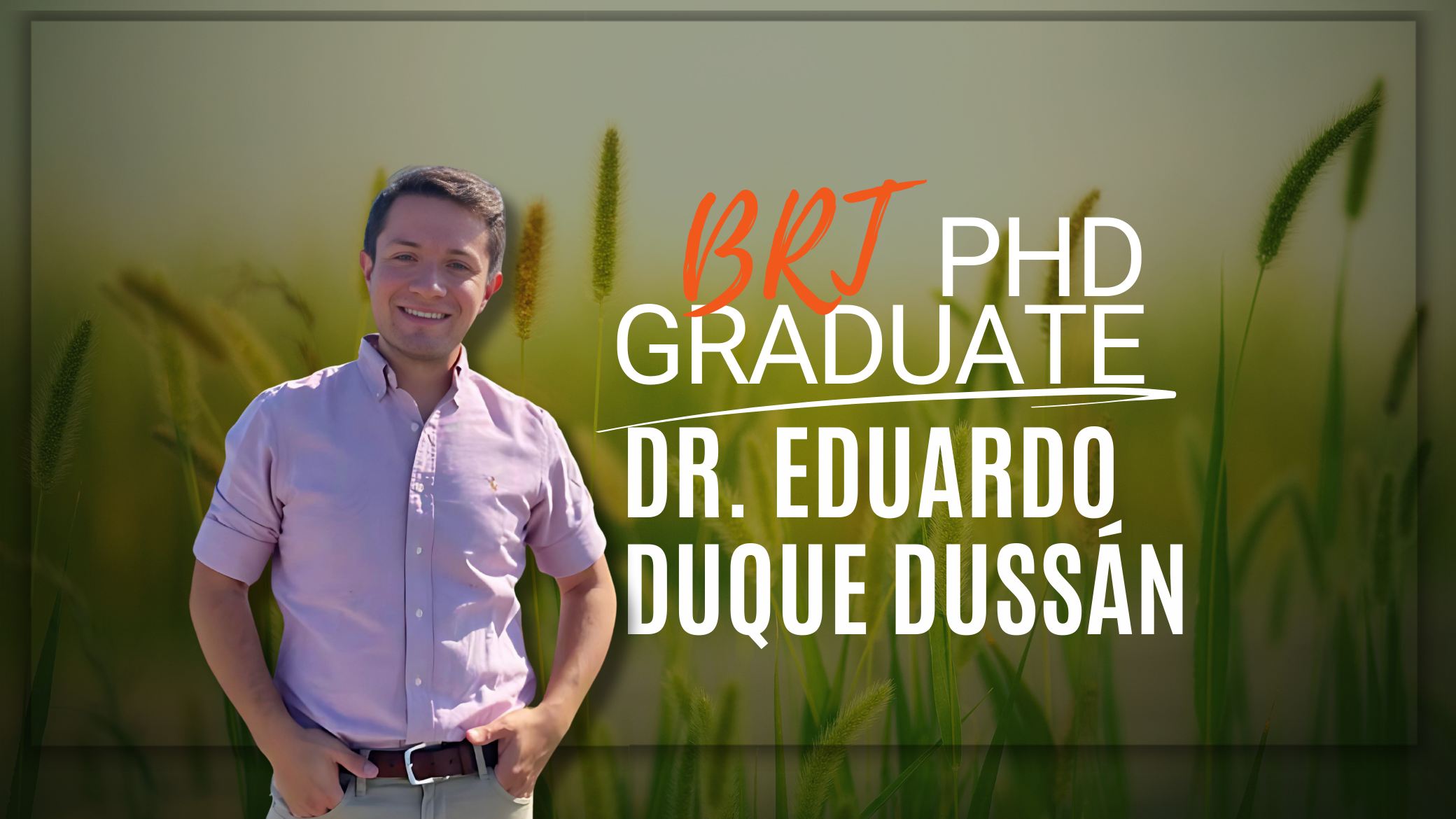Dr. Eduardo Duque Dussán earned his Ph.D. in Sustainable Technologies from the Czech University of Life Sciences (ČZU), Prague, specializing in the design and evaluation of a Hybrid Solar Tunnel Dryer for Parchment Coffee in Colombia (2020-2023). His academic journey includes an MBA from ESNECA Business School (2020-2021) and an MSc in Chemical and Process Engineering from the Czech Technical University (2017-2019).
Over the course of three years, his academic achievements during his doctoral studies include the publication of six papers, the presentation of research findings at 13 conferences, and the initiation of an ongoing patent. This body of work reflects a commitment to advancing knowledge and innovation within the academic field.
To get insights into Dr. Dussán’s academic journey from the ups and downs to tips and research strategy, our BRT Communications team conducted an interview to capture his thoughts and share his story.
ENJOY THE INTERVIEW!
Question 1: How does it feel to have successfully defended your doctoral dissertation?
Dr. Dussán: Successfully defending my doctoral dissertation is a moment marked by a profound sense of accomplishment, relief, and gratitude. It validates years of dedicated effort, signifying the conclusion of an intense academic journey and paving the way for new opportunities. The prevalent sentiment is gratitude towards mentors and supporters, emphasizing their crucial contributions. In essence, the experience is a blend of elation, satisfaction, and the anticipation of fresh beginnings, encapsulating a personal triumph and a commitment to the collective pursuit of knowledge.
Question 2: Can you share pivotal moments from your academic journey that you believe were crucial in successfully defending your doctoral dissertation?
Dr. Dussán: Reflecting on my academic journey, I realize that numerous moments were instrumental in successfully defending my doctoral dissertation. Early on, identifying my research focus was crucial, aligning my interests with addressing gaps in the existing literature. The publication of preliminary findings in reputable journals not only contributed to academic discourse but also garnered valuable feedback, shaping my research trajectory.
The data collection phase presented unforeseen challenges that evolved into pivotal learning experiences. Adapting and refining my research methods not only strengthened the robustness of my study but also showcased my ability to navigate complexity.
Throughout this journey, the unwavering support and guidance from faculty members were indispensable. Their mentorship, especially during the refinement of research questions and methodologies, enriched the depth of my work. The publication of related articles and the subsequent presentations at conferences were made possible with their encouragement, provided transformative experiences, exposed me to diverse perspectives, and refined the arguments in my dissertation.
The pre-defence mock sessions were another critical juncture, offering a platform to enhance my presentation skills and address potential challenges. Constructive feedback from faculty members and peers during these sessions significantly contributed to refining my arguments, ensuring I was well-prepared for the actual defence.
In essence, the support from faculty members, coupled with the publication of articles, played a vital role in shaping my academic journey and ultimately contributed to the successful defence of my doctoral dissertation.
Question 3: How has this achievement influenced your overall experience and professional growth?
Dr. Dussán: The successful defence of my doctoral dissertation has significantly impacted my overall experience and professional growth. It has sharpened my analytical and critical thinking skills, broadened my perspective through collaboration and mentorship, and positioned me as an expert in my field. The credibility gained has opened doors for further research, teaching opportunities, and valuable professional connections. The publication of articles stemming from my research has contributed to the academic community and increased my visibility within the field, positively influencing my career trajectory. Overall, this achievement has been transformative, laying a solid foundation for continued growth in both academic and professional spheres.
Question 4: Reflecting on the process, what were the significant challenges you encountered during your dissertation's writing and defence phases, and how did you navigate through them?
Dr. Dussán: Throughout the dissertation process, challenges arose that required strategic navigation. Balancing depth and clarity in writing involved constant feedback and collaboration. Managing time and stress, particularly in the final stages, required a disciplined schedule and peer support. In the defence phase, anticipating and addressing questions was tackled through thorough mock sessions, refining responses. Adaptability was crucial in responding to unexpected critiques during the defence. Overall, a proactive and collaborative approach was essential in overcoming challenges throughout both the writing and defence phases.
Question 5: Balancing academic commitments, personal life, and other responsibilities can be demanding. How have you managed to strike that balance while working on your dissertation?
Dr. Dussán: Balancing academic commitments, personal life, and additional responsibilities during my dissertation required disciplined time management. I set a structured schedule, communicated openly about demands, and prioritized tasks realistically. Regular breaks and engaging in non-academic activities were essential for maintaining balance and preventing burnout. Staying adaptable allowed me to navigate unexpected challenges while upholding a disciplined approach to managing multiple responsibilities.
Question 6: What valuable advice would you offer for fellow doctoral candidates preparing for their dissertation defence?
Dr. Dussán: The advice I have for other doctoral candidates is to:
Start Early and Plan Thoroughly: Begin your preparation well in advance. Plan a timeline that allows for thorough revisions and practice sessions. Starting early provides room for unforeseen challenges.
Department Defences and Peer Feedback: Conduct mock defence sessions with peers or mentors. Simulate the actual defence environment, anticipate potential questions, and refine your responses. Constructive feedback is invaluable in polishing your presentation and addressing weaknesses.
Know Your Material Inside Out: Ensure a deep understanding of every aspect of your dissertation. Be ready to confidently articulate your research questions, methodologies, findings, and contributions. Knowing your material thoroughly instils confidence and helps handle questions effectively.
Anticipate and Prepare for Questions: Anticipate possible questions and prepare thoughtful responses. This not only demonstrates your expertise but also helps you stay composed during the defence. Consider seeking feedback from colleagues to identify potential gaps in your defence strategy.
Stay Calm and Composed: Nervousness is natural, but maintaining composure is crucial. Take deep breaths, pause when needed, and respond thoughtfully. Remember, the defence is also an opportunity to showcase your expertise and passion for your research.
Engage with Your Audience: Foster a sense of engagement with your audience. Maintain eye contact, speak clearly, and invite questions. An interactive and engaging presentation can leave a positive impression on your examiners.
Be Open to Feedback: Approach the defence as a learning experience. Be open to constructive criticism and demonstrate a willingness to address feedback. This not only showcases your humility but also reflects your commitment to academic growth.
Remember, you are not alone in this process. Seek support from your advisors, peers, and mentors. Their insights and experiences can provide valuable guidance as you prepare for this critical milestone. Best of luck with your dissertation defence!
Question 7: Do you have any recommendations for current and future BRT students?
Dr. Dussán: As a member of the BRT who knows its environment and dynamics my recommendations are:
Build a Strong Foundation: Ensure a solid understanding of core concepts in business, research, and technology. Stay Updated: Keep abreast of industry trends and developments to stay relevant in your field. Embrace Technology: Develop proficiency in relevant technologies, enhancing your skills for practical applications. Cultivate Research Skills: Hone research skills for effective literature reviews, methodologies, and data analysis. Seek Experience: Gain practical experience through internships, co-ops, or research projects. Build a Network: Connect with professionals, professors, and peers through networking events and online platforms. Develop Soft Skills: Cultivate communication, teamwork, adaptability, and problem-solving skills. Consider Specializations: Explore niche specializations aligned with your interests and career goals. Balance Theory and Practice: Strike a balance between theoretical knowledge and practical application. Stay Adaptable: Embrace continuous learning to stay relevant in dynamic business and technology landscapes.
Question 8: Now that you have reached this momentous achievement - What are your plans for the future?
Dr. Dussán: I will continue to navigate the future with an open mind, dedicating myself to ongoing research endeavors and embracing the enriching experience of the PhD journey. I look forward to the opportunities and challenges that lie ahead.
We thank Dr. Dussán for sharing insights into his academic journey and wish him success, new discoveries, and a continued sense of fulfilment in his future endeavours!


